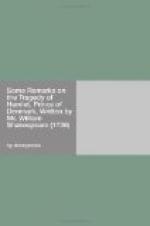The Sequel of this Scene by no Means answers the Dignity of what we have hitherto been treating of. Hamlet’s Soliloquy, after the Ghost has disappeared, is such as it should be. The Impatience of Horatio, &c. to know the Result of his Conference with the Phantom, and his putting them off from knowing it, with his Caution concerning his future Conduct, and his intreating them to be silent in Relation to this whole Affair; all this, I say, is natural and right; but his light and even ludicrous Expressions to them; his making them swear by his Sword, and shift their Ground, with the Ghost’s Crying under the Stage, and Hamlet’s Reflection thereupon, are all Circumstances certainly inferiour to the preceeding Part.
But as we should be very cautious in finding Fault with Men of such an exalted Genius as our Author certainly was, lest we should blame them when in reality the Fault lies in our own slow Conception, we should well consider what could have been our Author’s View in such a Conduct. I must confess, I have turn’d this Matter on every Side, and all that can be said for it (as far as I am able to penetrate), is that he makes the Prince put on this Levity of Behaviour, that the Gentlemen who were with him, might not imagine that the Ghost had reveal’d some Matter of great Consequence to him, and that he might not therefore be suspected of any deep Designs. This appears plausible enough; but let it be as it will, the whole, I think, is too lightly managed, and such a Design as I have mention’d might, in my Opinion, have been answered by some other Method more correspondent to the Dignity and Majesty of the preceeding Part of the Scene. I must observe once more, that the Prince’s Soliloquy is exquisitely beautiful.
I shall conclude what I have to say on this Scene, with observing, that I do not know any Tragedy, ancient or modern, in any Nation, where the Whole is made to turn so naturally and so justly upon such a supernatural Appearance as this is; nor do I know of any Piece whatever, where a Spectre introduced with so much Majesty, such an Air of Probability, and where such an Apparition is manag’d with so much Dignity and Art; in short, which so little revolts the Judgment and Belief of the Spectators. Nor have I ever met in all my Reading, with a Scene in any Tragedy, which creates so much Awe, and serious Attention as this does, and which raises such a Multiplicity of the most exalted Sentiments. It is certain, our Author excell’d in this kind of Writing, as has been more than once observed by several Writers, and none ever before or since his Time, could ever bring Inhabitants of another World upon the Stage, without making them ridiculous or too horrible, and the Whole too improbable and too shocking to Men’s Understandings.
ACT II.
Polonius and Reynoldo, and afterwards Ophelia.
Polonius’s Discourse to Reynoldo is of a good moral Tenour, and thus far it is useful to the Audience. His forgetting what he was saying, (p. 260) as is usual with old Men, is extremely natural, and much in Character for him.




